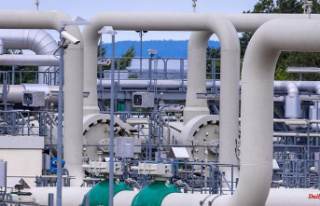Petrol and diesel are currently cheaper in Hungary than anywhere else in Europe. The government set the price by regulation. This puts many petrol station operators in existential distress and endangers the supply in the medium term.
The head of the Association of Independent Petrol Stations in Hungary has an urgent request to the customers: They should finally start saving petrol and preferably use public transport instead of coming to the petrol stations of his association members, Gábor Egri explained recently in an interview with rtl .huh Because while they are raking in record profits elsewhere, mineral oil companies and above all the gas station operators in Hungary have been making a loss with every liter sold for months. They can charge a maximum of 480 forints, the equivalent of 1.20 euros, for a liter of diesel or petrol.
Like other countries in Europe, the Hungarian government of Prime Minister Viktor Orbán wanted to cushion the consequences of the sharp increase in energy prices for the population. Instead of indirectly, for example with a tax cut like the German tank discount, Hungary set the price at the petrol pumps by decree. Since October last year it has been 480 forints. The state pays a subsidy of 20 forints per liter. However, this has not covered the costs of the gas station operators for a long time. After the dramatic increase during the spring, the market price for a liter of fuel has long been around 800 forints.
The foreseeable consequences of the market intervention: International corporations largely stopped importing fuel to Hungary because they can sell their products elsewhere for much more money. The entire fuel supply now rests on the shoulders of the state-owned Hungarian mineral oil company MOL. So far, he has been able to ensure the supply and, according to his own statements, has partially offset the losses in Hungary with profits in other countries. However, "sooner or later" petrol and diesel will become scarce if the price cap is not abolished, warns MOL boss Zsolt Hernadi.
According to Hernadi, the low price not only prevents less fuel from being imported and offered in Hungary, but at the same time is fueling consumption. According to the napi.hu portal, more fuel was sold in Hungary than ever before in the spring months. Since at least part of this high consumption was due to so-called tank tourism from neighboring countries, the government decreed at the end of May that the reduced price should only apply to Hungary. Since then, drivers with foreign license plates have had to pay almost twice as much.
However, the problems are by no means solved. Domestic demand is also so devastating for gas stations that all operators are now limiting the charge - sometimes to just ten liters per customer per day. According to reports, some gas station attendants are now even asking motorists directly to refuel somewhere else if possible. But they are not allowed to simply close down, otherwise, according to the government decree, they are threatened with being taken over by the state.
In addition, the different treatment of nationals and foreigners has called the EU Commission into action. Right-wing Prime Minister Orbán is already arguing with him about numerous issues, from freedom of the press to the treatment of minorities and the rule of law in Hungary, which is why the EU is withholding billions in payments that Orbán urgently needs for his budget. Last week, the Commission opened another infringement procedure over the unequal treatment of EU citizens at Hungary's petrol stations.
Orbán does not want to give in. His government can't get inflation under control. At 12.6 percent, it is well above that in the euro area. Without the petrol price cap, inflation would be five to six percent higher, according to Orbán.












